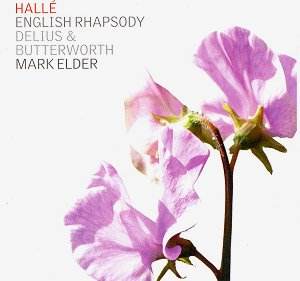This
is in many ways a thrilling recording. Mark Elder, undoubtedly
one of the most talented British conductors of his generation,
has signalled his intent to make his relationship with the Hallé
a long-term one. And on the evidence of this recording alone,
it is already bearing serious artistic fruit. These are meticulously
prepared, deeply felt and immensely stylish performances of English
music, some of it celebrated, some not quite so well known.
The
disc opens with George Butterworth’s four extant orchestral pieces,
all he had time to complete before a WW1 sniper’s bullet put an
end to his life at the age of 31. These works have all been fairly
frequently recorded, but never more beautifully than here. The
Hallé produces a fine, symphonic sound, which the producers
have captured magnificently. This sets it apart from the Marriner’s
Academy of St.Martin or Boughton’s English String Orchestra recordings;
both of these are very fine, but sound like relatively small-scale
versions, as you’d expect from chamber orchestras. A Shropshire
Lad in particular benefits greatly from the more expansive
sound, and also from Elder’s heartfelt approach. The woodwind
playing in the second of the Idylls is quite outstanding,
as you can hear from the exquisite balance of its opening, scored
for just oboe and two bassoons, (track 3), who present the Sussex
folk-song Phoebe and her dark-eyed sailor.
These
qualities are carried over into the Delius items. The first is
the ineffable Irmelin Prelude, completed when the composer
was in his final years. Despite the state of his health, in Irmelin
he created a gem, and it would make the perfect piece with
which to introduce someone to the music of Delius, for it distils
the essence of his style in just over five short minutes.
A
memorable performance of The Walk to the Paradise Garden follows,
illustrating clearly Elder’s special virtues. He sets off purposefully,
not as indulgent as most conductors. When the violins enter with
their gently syncopated figure (track 6 around 0:19), Elder keeps
the music moving forward – these lovers are not just going for
a stroll, they have an all-important goal in mind, and the purposeful
tread at the outset makes the relaxation in the dream-like central
section all the more poignant and musically telling.
The
larger-scale design of Brigg Fair, with its increasingly
free variations on the Lincolnshire folk-song, is a different
sort of challenge for conductor and orchestra, and one which they
rise to superbly. There is one moment of sour intonation (a bit
of disagreement between bass clarinet and cor anglais) around
1:39 on track 9, but this is a mere passing blemish. Elder builds
the work inexorably, and, though he lingers expressively where
necessary, the final climax arrives with enormous and fateful
power, the Hallé brass resounding splendidly. That uniquely
atmospheric opening, too, has never sounded lovelier, and, overall,
I felt this to be a truly revelatory performance, in the sense
that I perceived the work it in its full stature as I cannot remember
ever having done before, even with Beecham (though of course a
first-rate modern recording inevitably helps).
It
was a nice touch to include a couple of other items; first the
Hallé Choir, sounding as rejuvenated as their orchestral
colleagues, singing Percy Grainger’s lovely setting of the folk-song
Brigg Fair, with the rather throaty tenor of James Gilchrist.
Delius had been introduced to the melody by Grainger, who, in
his turn had heard it sung at a music festival in Brigg, Lincolnshire.
The singer then was a 72 year-old local, Joseph Taylor. Three
years later, Grainger managed to entice Taylor to a London studio
to record his songs, and, delightfully, his 1908 rendition of
Brigg Fair occupies the final track.
A
thoughtfully compiled programme, finely recorded, and containing
really impressive performances of all the music. I have a feeling
there may be a few exciting years ahead if the Elder/Hallé
partnership maintains this sort of level!
Gwyn
Parry-Jones

![]() James Gilchrist, tenor,
Joseph Taylor, singer
James Gilchrist, tenor,
Joseph Taylor, singer ![]() PASSIONATE HALLE CD
HLL 7503 [62:47]
PASSIONATE HALLE CD
HLL 7503 [62:47]